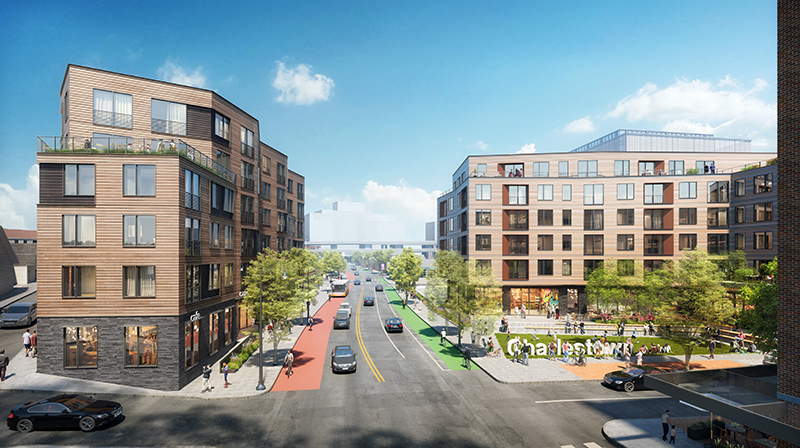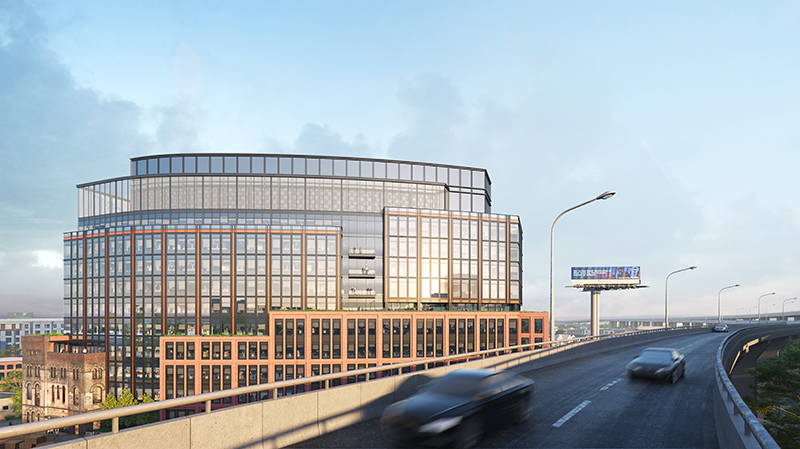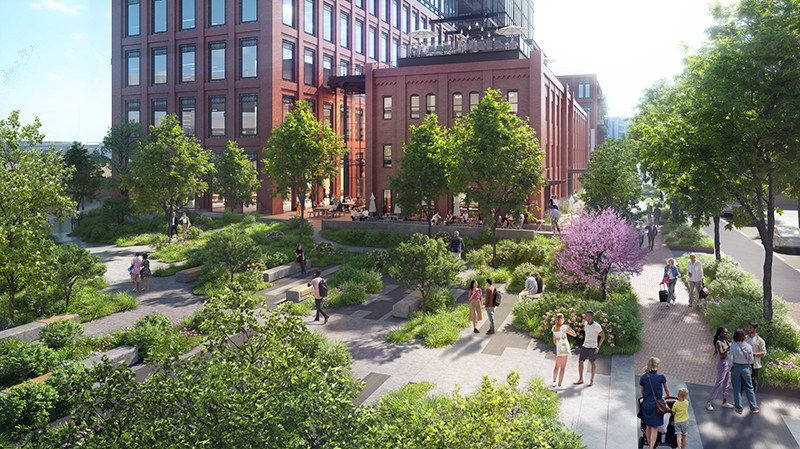
RISE receives approval for first of two neighborhood networks of Sullivan Sq. redevelopment project

Charlestown, MA RISE, a Boston-based minority-owned developer and construction firm, has received approval from the Boston Planning and Development Agency (BPDA) for the first of two neighborhood networks of the Sullivan Square Redevelopment project.
The 750,000 s/f Inner Belt neighborhood, also known as the 40 Roland St. project, reimagines five separate parcels to provide a job-centric program mix across three new buildings.
The Sullivan Square Redevelopment project seeks to leverage growth in the innovation sector to deliver an affordable, inclusive, and pedestrian-focused mixed-use environment. RISE has partnered with Boston-based minority developer TRAX, and architectural design firm CBT.
“This milestone approval and path forward is a direct result of the participation and input from our Charlestown neighbors and the local leadership,” said Herby Duverné, co-founder of RISE. “The 40 Roland St. project is one of two planned networks with a focus on equitable outcomes, including job creation, affordable housing, and overall quality of life. We are thrilled to move this forward.”
“This project is a fantastic opportunity for placemaking in a neighborhood that’s been overlooked for too long,” said Laura Rushfeldt, senior project architect at CBT Architects. “Working with RISE we are able to see our design vision come to life and ensure that we really celebrate the heritage of this place, while still bringing in forward-thinking building design.”

Commitment to Affordable Housing
Following guidance from the city’s affordable housing initiatives and future increase in policy benchmarks, RISE has proactively made a commitment to create 20% affordability across the entire residential program in the Sullivan Square Redevelopment project.
Two residential buildings, located at 128 and 145 Cambridge St., will create 126 units and a new gateway into the formerly industrial section of the neighborhood to welcome neighbors, residents, and workers into the new innovation corridor.
Investment in Innovation and Economic Opportunity
40 Roland St. will be the first significant investment in the ‘Innovation Corridor’ of the Sullivan Sq. redevelopment, with a goal of advancing economic opportunity in the area. The building will create 631,800 s/f of lab and maker space, including digital fabrication, and engineering, and a machine shop. The light industrial uses pay homage to the neighborhood’s industrial past, while creating space for the neighborhood to participate in the life sciences ecosystem that Massachusetts has become.
With sustainability in mind, the design team at CBT has made a conscious effort to preserve as many elements and materials as possible at 24 Roland St., integrating it into the new campus context of 40 Roland. To create a seamless appearance of integration, 40 Roland’s south façade will also be preserved.
The innovation corridor will be complemented both by the local retail and services designed for residents and employees, as well as the proximity to similar innovation clusters and educational institutions. Onsite services will include event and conference space, a new café and collaboration space, and local retail. 24 Roland will be the future home to 16,600 s/f of subsidized community retail space for local Charlestown small businesses. 40 Roland will pay homage to its former resident brewery, Puritan Brewing Co., by partnering with an MBE/WBE/VBE brewery partner to occupy the space.
The project will create over 1000 union jobs, and 2,000 permanent jobs, and contribute over $7 million in linkage payments to the city of Boston.

Open Space + Infrastructure Integration
As part of RISE’s approach to creating more resilient neighborhoods, the team understands that promoting broader mobility and accessibility for all improves the connectivity of these communities but also ensures that the built environment is welcoming to all people regardless of age, physical condition, or language.
The 40 Roland St. Project will reknit Sullivan Square’s dispersed parcels by creating 1.6 acres of publicly accessible open space and green parks, as well as an investment of millions of dollars into the public realm and infrastructure improvements. Four new public spaces will increase the connectivity of the area and provide new green space for all residents. These parks include:
- Crescent park – a new 5,500 s/f public park along Crescent St., adjacent to the new residential buildings;
- Brighton Park - a new 6,789 s/f public park along Cambridge St.;
- Crosby Garden – 11,176 s/f public green space adjacent to the preserved 24 Roland community retail space; and
- Roland Plaza – 17,755 s/f of flexible public space outside of the 40 Roland Campus.
Additional landscaping, public realm, and roadway improvements, will further enhance the safety and connectivity for pedestrians, cars, and bicyclists, including Cambridge Bridge and underpass upgrades, new mid-block crosswalks, ADA ramps, TMA memberships, improvements and additional bike lanes, re-curbing, street trees, bus shelters, lighting and increased detail to landscape and terrace areas. A MAPC multi-modal path will link Charlestown, Assembly Row, and Union Square for enhanced commuting and recreational traversing.
Sustainability & Resiliency
RISE has made a significant investment in a sustainable project design, integrating sustainability and resiliency at all levels, including having the buildings meet LEED Gold standards. The project will also be utilizing renewable energy and zero carbon design principles to mitigate the project’s environmental impacts. Sustainable strategies include complete electrification for residential buildings, hybrid power for lab, and highly efficient building envelopes will help achieve over 35% energy reduction for all buildings. RISE plans to incorporate over 100 net new trees throughout the project and streetscapes. The entire project grade will be raised to provide continuity between public realm and buildings, ensuring protection from sea level rise while also continuing to create accessible pedestrian and bike connections. Other measures, such as evaluating rainwater reuse and green roofs will also be integrated.
The RISE team is prepared to break ground, beginning with the residential projects at 128 and 145 Cambridge St. as soon as the process allows as the capital required for the two buildings has been lined up. The team anticipates this milestone will help move the advanced conversations regarding capital for the lab component, and is excited about the prospects.